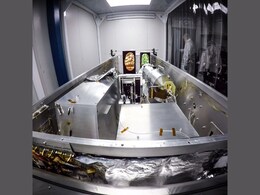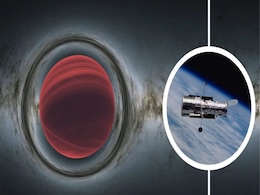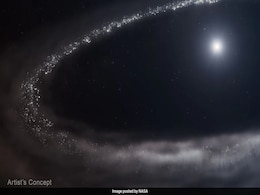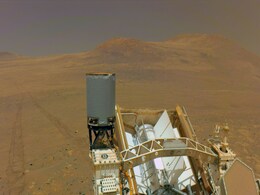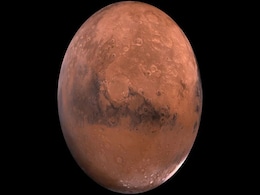New Planet Found
- All
- News
- Videos
-

Astronomers Successfully Weigh a Starless ‘Rogue Planet’ Drifting Through the Milky Way
- Monday January 5, 2026
- Written by Gadgets 360 Staff
Astronomers have precisely measured the mass of a rogue planet wandering through the Milky Way using a rare gravitational microlensing event. By combining observations from ground-based telescopes across three continents with data from ESA’s Gaia spacecraft, researchers determined the planet’s distance and found it to be about the mass of Satur...
-
 www.gadgets360.com
www.gadgets360.com
-

Scientists Finally Identify What Drives Venus’s Fast Winds
- Saturday November 29, 2025
- Written by Gadgets 360 Staff
A new study has identified the primary force behind Venus’s extreme superrotating atmosphere: a once-per-day thermal tide driven by solar heating. Using data from Venus Express and Akatsuki along with circulation models, researchers show that this daily tide transports most of the momentum that accelerates cloud-top winds to speeds over 100 metre...
-
 www.gadgets360.com
www.gadgets360.com
-

Newly Found ‘Super-Earth’ GJ 251 c Could Be One of the Most Promising Worlds for Alien Life
- Sunday October 26, 2025
- Written by Gadgets 360 Staff
A new super-Earth, GJ 251 c, has been found orbiting a nearby red dwarf star within its habitable zone. About four times Earth’s mass, it may host liquid water. Detected via the radial-velocity method using Penn State’s Habitable Zone Planet Finder, it’s a prime target in the search for life.
-
 www.gadgets360.com
www.gadgets360.com
-

Plastic Pollution Threatens Human Health: Study
- Monday August 4, 2025
- Feature | Indo-Asian News Service
Ahead of the UN treaty on plastics, a new report in The Lancet journal on Monday has warned that plastic pollution is an underrecognized threat to the health of both humans and the planet, which must be addressed immediately.
-
 www.ndtv.com
www.ndtv.com
-

New Rogue Planet Discovered in Hubble Data Using Einstein’s Gravity Theory
- Friday August 1, 2025
- Written by Gadgets 360 Staff
Astronomers discovered a rogue planet hidden in Hubble’s archival data using gravitational microlensing based on Einstein’s theory. The event, OGLE-2023-BLG-0524, lasted just eight hours and lacked signs of a host star, suggesting the planet might be truly free-floating.
-
 www.gadgets360.com
www.gadgets360.com
-

Uranus Found Emitting Internal Heat, Reviving Hopes for Flagship NASA Mission
- Thursday July 17, 2025
- Written by Gadgets 360 Staff
Astronomers have discovered that Uranus emits 12% more heat than it receives from sunlight, contradicting past data from Voyager 2. The internal warmth likely comes from leftover energy in the planet’s core, offering clues to its tilt and interior structure. This unexpected heat has intensified calls for a flagship NASA mission to Uranus. Scienti...
-
 www.gadgets360.com
www.gadgets360.com
-

James Webb Telescope Maps Fiery Atmosphere of Turbulent Exoplanet WASP-121b
- Sunday June 8, 2025
- Written by Gadgets 360 Staff
NASA’s James Webb Space Telescope has unveiled the turbulent history of WASP-121b, a scorching exoplanet distorted by its star’s gravity. New atmospheric data reveals unusual molecules like silicon monoxide and methane, shedding light on the planet’s violent migration and extreme climate. These findings challenge current models and enhance un...
-
 www.gadgets360.com
www.gadgets360.com
-

James Webb Telescope Detects Frozen Water In Young Star System For The First Time
- Tuesday June 3, 2025
- Science | Edited by Ritu Singh
This finding has opened up new avenues for understanding the early universe and the origins of water on our planet
-
 www.ndtv.com
www.ndtv.com
-

NASA’s Perseverance Explores Mars' Oldest Rocks in Krokodillen Region
- Thursday May 22, 2025
- Written by Gadgets 360 Staff
NASA’s Perseverance rover has reached Krokodillen, a 73-acre plateau near Jezero Crater's rim believed to host some of Mars’ oldest rocks. Preliminary data shows signs of clays, carbonates, and olivine minerals, suggesting ancient water activity. Currently examining a site named Copper Cove, the rover is using a new sampling strategy that allow...
-
 www.gadgets360.com
www.gadgets360.com
-

Asteroid Vesta May Be a Fragment of a Lost Planet, Say Scientists
- Friday May 9, 2025
- Written by Gadgets 360 Staff
Vesta, once believed to be a stalled protoplanet, may be a fragment of a long-lost differentiated planet. Using refined gravity data from NASA’s Dawn mission, scientists found it lacks a dense core, suggesting it was ejected during a primordial impact. This revised view may apply to other asteroids and reshape planetary formation theories.
-
 www.gadgets360.com
www.gadgets360.com
-

Super Earths are Quite Common Outside the Solar System, New Study Reveals
- Saturday April 26, 2025
- Written by Gadgets 360 Staff
Using the microlensing technique, KMTNet studied the exoplanet, which is twice as big as Earth, yet smaller than Neptune. It is believed that there are more such super-Earths outside our solar system. It is common to have such planets orbiting their stars.
-
 www.gadgets360.com
www.gadgets360.com
-

Water on Ancient Mars? New Study Challenges the Cold Planet Theory
- Saturday April 26, 2025
- Written by Gadgets 360 Staff
Scientists have uncovered compelling evidence suggesting that early Mars was surprisingly wet, featuring extensive networks of lakes and river basins shaped by rainfall and snowfall. This challenges long-held views of a predominantly cold and icy ancient Mars. Despite current climate models struggling to explain sustained liquid water on the Red Pl...
-
 www.gadgets360.com
www.gadgets360.com
-

NASA Rover Finds New Evidence Of Warm, Wet Past Of Mars
- Thursday April 17, 2025
- World News | Reuters
A mineral called siderite found abundantly in rock drilled by a NASA rover on the surface of Mars is providing fresh evidence of the planet's warmer and wetter ancient past when it boasted substantial bodies of water and potentially harboured life.
-
 www.ndtv.com
www.ndtv.com
-

Two New Exoplanets Found Orbiting a Star in Draco Constellation
- Wednesday April 2, 2025
- Written by Gadgets 360 Staff
Astronomers have identified two exoplanets, TOI-1453 b and TOI-1453 c, orbiting a star 250 light-years away in Draco. The planets, a super-Earth and a sub-Neptune, were detected using NASA’s TESS satellite and the HARPS-N spectrograph. TOI-1453 b is a rocky planet orbiting close to its star, while TOI-1453 c is twice Earth’s size and may have a...
-
 www.gadgets360.com
www.gadgets360.com
-

4 Planets Found Orbiting Earth's Nearest Star. They Are Too Hot For Life
- Wednesday March 12, 2025
- World News | Asian News International
Astronomers have revealed new evidence that there are not just one but four tiny planets circling around Barnard's Star, the second-nearest star system to Earth.
-
 www.ndtv.com
www.ndtv.com
-

Astronomers Successfully Weigh a Starless ‘Rogue Planet’ Drifting Through the Milky Way
- Monday January 5, 2026
- Written by Gadgets 360 Staff
Astronomers have precisely measured the mass of a rogue planet wandering through the Milky Way using a rare gravitational microlensing event. By combining observations from ground-based telescopes across three continents with data from ESA’s Gaia spacecraft, researchers determined the planet’s distance and found it to be about the mass of Satur...
-
 www.gadgets360.com
www.gadgets360.com
-

Scientists Finally Identify What Drives Venus’s Fast Winds
- Saturday November 29, 2025
- Written by Gadgets 360 Staff
A new study has identified the primary force behind Venus’s extreme superrotating atmosphere: a once-per-day thermal tide driven by solar heating. Using data from Venus Express and Akatsuki along with circulation models, researchers show that this daily tide transports most of the momentum that accelerates cloud-top winds to speeds over 100 metre...
-
 www.gadgets360.com
www.gadgets360.com
-

Newly Found ‘Super-Earth’ GJ 251 c Could Be One of the Most Promising Worlds for Alien Life
- Sunday October 26, 2025
- Written by Gadgets 360 Staff
A new super-Earth, GJ 251 c, has been found orbiting a nearby red dwarf star within its habitable zone. About four times Earth’s mass, it may host liquid water. Detected via the radial-velocity method using Penn State’s Habitable Zone Planet Finder, it’s a prime target in the search for life.
-
 www.gadgets360.com
www.gadgets360.com
-

Plastic Pollution Threatens Human Health: Study
- Monday August 4, 2025
- Feature | Indo-Asian News Service
Ahead of the UN treaty on plastics, a new report in The Lancet journal on Monday has warned that plastic pollution is an underrecognized threat to the health of both humans and the planet, which must be addressed immediately.
-
 www.ndtv.com
www.ndtv.com
-

New Rogue Planet Discovered in Hubble Data Using Einstein’s Gravity Theory
- Friday August 1, 2025
- Written by Gadgets 360 Staff
Astronomers discovered a rogue planet hidden in Hubble’s archival data using gravitational microlensing based on Einstein’s theory. The event, OGLE-2023-BLG-0524, lasted just eight hours and lacked signs of a host star, suggesting the planet might be truly free-floating.
-
 www.gadgets360.com
www.gadgets360.com
-

Uranus Found Emitting Internal Heat, Reviving Hopes for Flagship NASA Mission
- Thursday July 17, 2025
- Written by Gadgets 360 Staff
Astronomers have discovered that Uranus emits 12% more heat than it receives from sunlight, contradicting past data from Voyager 2. The internal warmth likely comes from leftover energy in the planet’s core, offering clues to its tilt and interior structure. This unexpected heat has intensified calls for a flagship NASA mission to Uranus. Scienti...
-
 www.gadgets360.com
www.gadgets360.com
-

James Webb Telescope Maps Fiery Atmosphere of Turbulent Exoplanet WASP-121b
- Sunday June 8, 2025
- Written by Gadgets 360 Staff
NASA’s James Webb Space Telescope has unveiled the turbulent history of WASP-121b, a scorching exoplanet distorted by its star’s gravity. New atmospheric data reveals unusual molecules like silicon monoxide and methane, shedding light on the planet’s violent migration and extreme climate. These findings challenge current models and enhance un...
-
 www.gadgets360.com
www.gadgets360.com
-

James Webb Telescope Detects Frozen Water In Young Star System For The First Time
- Tuesday June 3, 2025
- Science | Edited by Ritu Singh
This finding has opened up new avenues for understanding the early universe and the origins of water on our planet
-
 www.ndtv.com
www.ndtv.com
-

NASA’s Perseverance Explores Mars' Oldest Rocks in Krokodillen Region
- Thursday May 22, 2025
- Written by Gadgets 360 Staff
NASA’s Perseverance rover has reached Krokodillen, a 73-acre plateau near Jezero Crater's rim believed to host some of Mars’ oldest rocks. Preliminary data shows signs of clays, carbonates, and olivine minerals, suggesting ancient water activity. Currently examining a site named Copper Cove, the rover is using a new sampling strategy that allow...
-
 www.gadgets360.com
www.gadgets360.com
-

Asteroid Vesta May Be a Fragment of a Lost Planet, Say Scientists
- Friday May 9, 2025
- Written by Gadgets 360 Staff
Vesta, once believed to be a stalled protoplanet, may be a fragment of a long-lost differentiated planet. Using refined gravity data from NASA’s Dawn mission, scientists found it lacks a dense core, suggesting it was ejected during a primordial impact. This revised view may apply to other asteroids and reshape planetary formation theories.
-
 www.gadgets360.com
www.gadgets360.com
-

Super Earths are Quite Common Outside the Solar System, New Study Reveals
- Saturday April 26, 2025
- Written by Gadgets 360 Staff
Using the microlensing technique, KMTNet studied the exoplanet, which is twice as big as Earth, yet smaller than Neptune. It is believed that there are more such super-Earths outside our solar system. It is common to have such planets orbiting their stars.
-
 www.gadgets360.com
www.gadgets360.com
-

Water on Ancient Mars? New Study Challenges the Cold Planet Theory
- Saturday April 26, 2025
- Written by Gadgets 360 Staff
Scientists have uncovered compelling evidence suggesting that early Mars was surprisingly wet, featuring extensive networks of lakes and river basins shaped by rainfall and snowfall. This challenges long-held views of a predominantly cold and icy ancient Mars. Despite current climate models struggling to explain sustained liquid water on the Red Pl...
-
 www.gadgets360.com
www.gadgets360.com
-

NASA Rover Finds New Evidence Of Warm, Wet Past Of Mars
- Thursday April 17, 2025
- World News | Reuters
A mineral called siderite found abundantly in rock drilled by a NASA rover on the surface of Mars is providing fresh evidence of the planet's warmer and wetter ancient past when it boasted substantial bodies of water and potentially harboured life.
-
 www.ndtv.com
www.ndtv.com
-

Two New Exoplanets Found Orbiting a Star in Draco Constellation
- Wednesday April 2, 2025
- Written by Gadgets 360 Staff
Astronomers have identified two exoplanets, TOI-1453 b and TOI-1453 c, orbiting a star 250 light-years away in Draco. The planets, a super-Earth and a sub-Neptune, were detected using NASA’s TESS satellite and the HARPS-N spectrograph. TOI-1453 b is a rocky planet orbiting close to its star, while TOI-1453 c is twice Earth’s size and may have a...
-
 www.gadgets360.com
www.gadgets360.com
-

4 Planets Found Orbiting Earth's Nearest Star. They Are Too Hot For Life
- Wednesday March 12, 2025
- World News | Asian News International
Astronomers have revealed new evidence that there are not just one but four tiny planets circling around Barnard's Star, the second-nearest star system to Earth.
-
 www.ndtv.com
www.ndtv.com



